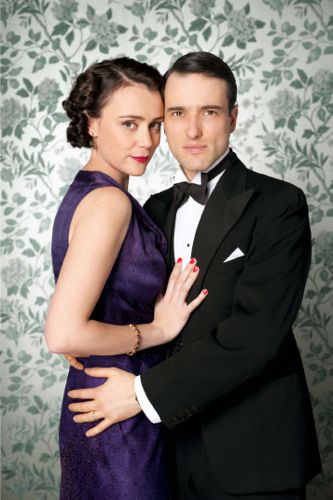
“THIS is London…”
A BBC Radio announcer and the chimes of Big Ben herald the return of Upstairs Downstairs.
Its first full BBC1 series following the three episodes screened at Christmas 2010.
Keeley Hawes (Lady Agnes Holland) and Ed Stoppard (Sir Hallam Holland) again lead the line upstairs at 165 Eaton Place.
With Alex Kingston arriving in episode one as Dr Blanche Mottershead, the younger sister of Lady Holland.
Dame Eileen Atkins, who played Lady Holland, having decided not to continue in her role.
New faces later in the series include Emilia Fox and Sarah Lancashire.
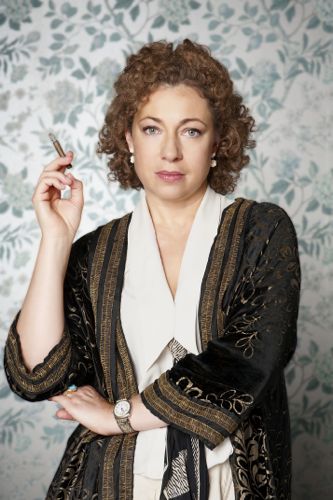
I attended the London press launch for the new series last month.
Where we were shown the first episode, which begins in September 1938 with Sir Hallam worried about events in Hitler’s Germany.
Writer and executive producer Heidi Thomas then took part in two Q&A sessions with fellow executive producer Faith Penhale, who is also Head of Drama at BBC Wales.
The first included the Upstairs cast and the second the Downstairs.
My edited transcript is below with spoilers, including a spot of monkey business in episode one.
But I’ve left out some of the more major revelations related to the main characters.
So hopefully what you read won’t spoil your enjoyment of the series.
Certain sections of the media are still determined to push the line of Upstairs Downstairs versus Downton Abbey.
When it’s clear from the viewing figures that there is ample room for both shows.
Cranford writer Heidi is also responsible for current Sunday night hit Call The Midwife.
And knows exactly what is required to draw us into the world of 165 and pre-war Britain.
We learned, for example, that episode two contains both violet macaroons and a teenage JFK.
What other television drama can give you that?
Upstairs Downstairs returns to BBC1 at 9:30pm on Sunday (Feb 19).
**********************************************************************
Heidi Thomas – writer / Faith Penhale – executive producer and Head of Drama BBC Wales / Upstairs cast:
Q: Heidi – what did you want to achieve with this first full series?
Heidi Thomas: “I think the vision I had has been achieved for it by the production team. What I really wanted – it was so fantastic to have…when we did our Christmas pilot, or our Christmas special, which is really all that we set out to do then, we had three hours to tell the story of a year in the life of these two families who inhabit 165 Eaton Place. This time around we had twice as long. So I really wanted to make it at once more intimate and more epic. And that involved a certain amount of what I used to think of as breaking out of the doll’s house. I wanted everything to feel very immediate and real and connected to London and Europe and the big things that were going on in the world. And I think that has been delivered by the production team.”
Q: You lost Eileen Atkins (Lady Holland), who left, and Jean Marsh (Rose Buck) was very ill. How disruptive was that?
Heidi Thomas: “Those events were of two halves really. With Eileen it was all very mutual and not acrimonious in any way. And we did have almost three months before we started filming, which is a hell of a long time in modern television. So that didn’t present us with any practical difficulties, really. Obviously Jean is exceptionally dear to us and when we found out that she was unwell…that was different. That was an emotional experience for all of us as well because we just adore Jean. And I remember saying to Annie (Reid), ‘Rose cannot leave us. It would be like the ravens leaving the Tower. She’s so integral to 165.’ But in fact what we did…Jean’s recovery was our main priority. We had three plans of action and we waited to see how rapid her recovery was going to be and then we implemented one of those. So with a bit of forward planning and lots of tender loving care I think we got through that OK. She makes her first appearance in episode three and then we see her again before the end of the series. But I’m not giving anything away.”

Q: Why did you choose this time period?
Heidi Thomas: “Initially I think I first came to it in research terms because it reflected the amount of time that would have passed between that series going out – the Christmas special – and this one going out, which we knew would be for roughly a year later. But I became captivated by the politics and the the Home Front, if you will, in 1938. I hadn’t realised how close the people of Britain felt they were to war. I was amazed to find out that gas masks were being issued, that they were digging trenches. They were beginning to rehearse the evacuation of children. I found that fascinating and I think I thought the audience would find that amazing as well. We often talk in drama about, ‘Things will never be the same again,’ and ‘Big change is going to happen.’ But I thought it was rather interesting to be there at the very beginning point of that change. In some ways socially, I think the Second World War began in 1938 – and it just gave us a wonderful framework for the year. This series goes through from September 1938 to September 1939 and the outbreak of war itself.”
Q: We understand that Lady Persie is rather naughty in this series. How naughty does she become?
Claire Foy (Ladie Persie): “As naughty as it’s possible to get, I think.”
Heidi Thomas: “Whilst never perceiving herself as anything other than good, I think.”
Claire Foy: “Oh yeah. She loves herself. And I love her too very dearly. Apart from fascism. She just does what makes her happy and doesn’t really see why everyone else has a problem with it. But people have lots of problems with lots of things that she does in this series. Literally she does everything that’s possible to do, wrong.”
Faith Penhale: “She very much has her own moral code that she lives by. Not shared by others.”

Q: How does what happens affect her relationship with older sister Agnes (Keeley Hawes)?
Faith Penhale: “There are consequences when that is then played out. It’s a very complicated sisterly relationship.”
Claire Foy: “They’ve got a really difficult relationship anyway. Not difficult, but there’s so much history to it. There’s so much jealousy.”
Keeley Hawes: “But Agnes still loves that little Nazi (Persie).” (laughter)
Q: The Downton Abbey issue?
Faith Penhale: “The shows are so different. And I think the settings are so different and the worlds are so different. There’s absolutely space for both shows. It’s never about, ‘In what way are we similar to Downton?’ We see ourselves as very much like we do our own thing. So they really are different. The fact is we’re London 1938 – I don’t even know what year they’re set. But it’s way before that. And it’s not London. A very different set of characters, worlds and themes.”
Heidi Thomas: “It hasn’t been part of our thinking while we make the show at all. We’re so centred on what we do and I think we’re all so passionate about these two families at this time in history. That’s our story.”
Claire Foy: “I don’t think anyone who ever writes any TV programme ever would ever say…someone who was writing Corrie would ever say, ‘Oh in EastEnders they did this, so we’ll do that.’ It’s not really how it works.”
Heidi Thomas: “No, it just isn’t.”
Michael Landes (Caspar Landry): “Except for in America. They do that all the time!” (laughter)
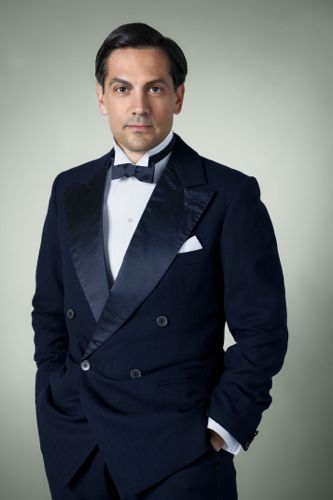
Q: How saucy does Upstairs Downstairs get this series?
Heidi Thomas: “Oh, I don’t know. I suppose it depends where your baseline is, really. All I can say without giving away any games is – we are more intimate and more epic than last time. So you’ll see more politics and you’ll see more of people’s private lives.”
Faith Penhale: “I think it’s also just worth saying that there’s a lot of romance as well in this series.”
Heidi Thomas: “You have to remember it’s 1939 so there are some areas where a lot of nice people wouldn’t go. There’s moral codes in place. It’s one of the reasons why I like writing period drama because even a kiss can have consequences. The brush of two hands on the stairs can have consequences. It’s not like the modern world where you have to be jumping in and out of bed every five minutes to make any impact on anybody’s lives. We do always adhere to that code. So by modern standards it’s not very saucy at all in actual fact.”
Faith Penhale: “There’s obvious betrayal as well. But that’s a different thing, isn’t it? I think what’s really interesting about 165 is that every character in the house has their own emotional story to play out and they all, in their own way, have their hearts broken, their hopes are dashes, their ideas are challenged. So it’s very emotional.”
Heidi Thomas: “A lot of people get pushed to the edge. And whether that’s in terms of what experience ladles upon them or what choices they are forced to make. I like to take all the characters on a journey and that’s what was lovely about having time to do that this year.”


Q: The characters that Sarah Lancashire and Emilia Fox are going to play?
Heidi Thomas: “You’ll meet Emilia first and Sarah comes in later. Emilia connects with the upstairs world of 165 and Miss Whisset connects with the downstairs world. Emilia plays a character called Portia, Lady Alresford and Sarah Lancashire plays a character called Miss Violet Whisset. Emilia plays a character in her thirties and…I really don’t want to give the game away because it lets you know things about other characters in the show ahead of time and I think it will spoil it for the audience.”
Faith Penhale: “It’s also worth saying that they both connect with characters in the house who have space in their hearts for these characters to come into their lives. Portia – Emilia Fox – makes a connection with Blanche and Miss Whisset makes a connection with Mr Pritchard.”
Q: Michael – can you tell us about Caspar?
Michael Landes: “I have a relationship with Lady Agnes. I’m an American entrepreneur, a wealthy businessman, that comes over and strikes up a relationship that evolves and grows over the six episodes. I balance out her naughty sister’s behaviour. I think I represent something very liberating or refreshing to Lady Agnes.”
Keeley Hawes: “It’s very difficult.” (laughter)

Q: Killing off Soloman the monkey – any qualms about doing that?
Heidi Thomas: “Not really. The thing is, Maud (Lady Holland) and Soloman were such kindred spirits. The idea of a poor lost soul of a monkey wandering through six episodes with nobody to love him was just unbearable. So I thought we’d do the kindest thing. No monkeys were harmed in any way. It’s all handled very delicately. And one of the things that you do find with wildlife on set is they are often looked after better than the human actors. They are so well taken care of and well trained and their welfare is always there to the fore. We did have a little flag up from health and safety who said they didn’t like seeing his corpse on the kitchen table because that was a surface where food was normally prepared.”
Q: Alex – Blanche made a big impact in the first episode. What can we see coming up for her?
Alex Kingston (Dr Blanche Mottershead): “She gradually roots herself into 165 Eaton Place. I think initially you’ll see Agnes and Hallam (Ed Stoppard) being rather frustrated by her presence. But she certainly, towards the end of the series I think, becomes somewhat of an ally to Agnes. And is quite instrumental in encouraging Agnes to find herself, gain confidence in herself. She’s not a fly in the ointment but she certainly stirs things up and she has her secrets as well, which are revealed.”
Faith Penhale: “And she has a very liberal approach to life which I think is one of her key qualities in the Upstairs dynamic, is that she’s quite a radical. She’s quite out there with some of her ideas, from the carrot juice to the seaweed, kelp or whatever to rather bigger ideas.”
Alex Kingston: “She’s what I suppose in those days one would call an adventuress and she’s been to university, she’s lived in North Africa, she’s worked alongside archeologists and is very much part of that world. A sort of Gertrude Bell-type character. I’m sure she would have looked up to someone like Gertrude Bell. And so to come from a rather free existence into the relative constraints of 165, she doesn’t understand why she necessarily would have to conform to the very beautifully kept world that they’ve created for themselves. She shakes it up a bit.”
Faith Penhale: “And has quite a lot of influence.”

Q: There’s a strong sense of 1938 and the fear of war that was coming. Did any of you in your research or in any of scenes find anything particularly striking or reflect on anything about that period of history?
Blake Ritson (Duke of Kent): “I was very assiduous in my research for the Duke of Kent where he has to give a masterclass on how to make the perfect Manhattan. I toured round mainline Europe…”
Alex Kingston: “I find the choice that Heidi’s made in terms of when to set this, I actually think it’s quite clever. Personally, I feel that at the moment we are on the verge of something that we don’t really know. There’s the whole predictions – 2012 is the end of the world…in a funny sort of way the world is going to change very radically and I think there is a lot fear because we do not know what’s going to happen but it is going to change. And I think it’s actually quite clever that this television show…you’re seeing it’s reflecting that and you’re seeing people on the very edge of something that they just don’t know what’s going to happen. They’ve lived through the First World War, that was horrendous. But they know that with all the advances in technology at that time, weaponary and everything, that this could be the end of the world potentially in terms of their imagination. So I think it’s a very good idea. People will identify with the fears of the characters, in a way.”
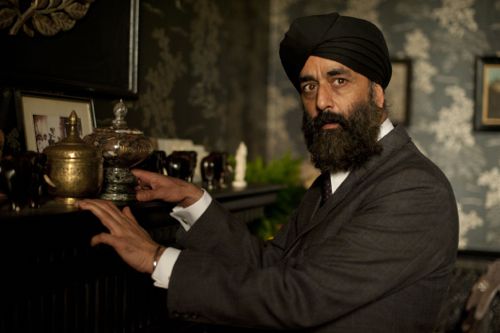
Heidi Thomas: “One of the things I love about writing period drama is that there is an inherent dramatic engine in it, in that we all know more than our characters about how their world is going to turn out. And the note I always give myself is – 1938, or as we move on to 1939, is the present. These characters at this point don’t really know – Hallam has a pretty good idea, I think, because he’s a very perspicacious diplomat. But our characters can’t fully see the extent to which their world is going to be torn open by this. It’s a great trope in drama to say, ‘And nothing is ever going to be the same again.’ But come 1945, this world will end. Belgravia will end. That house cannot exist in this form and this society can no longer exist in this form. And that’s very exciting.”
Alex Kingston: “This is the beginning, really, of the modern world as we know it and everything that you have seen prior to that will no longer exist. Women’s lives changed forever and here is a society, a group of people that are clinging on to what they know, their past. And it is absolutely going to change irrevocably.”
Q: What sort of change to do you think we’re on the cusp of now?
Alex Kingston: “Oh, I don’t want to think about it. I don’t know. It is going to change, isn’t it? In a way, 2012 will be the end of the world as we know it.”
Art Malik (Mr Amanjit): “You arrive. You go into make-up. Suddenly make-up are changing you. They’re bringing you into the period. Then you go into your trailer. You put on your costumes which have been sourced. And suddenly you’re in the period. And then you go on to these sets – whether they’re actually the ones that have been built in Wales or whether we go to a park and convert it or go to a side of a building and make it look as if you’re inside the Albert Hall…the art department and the production team’s values are there. Mark as the director was wonderful in the way that he shot it. The way he’s used his visual narrative makes our job so much easier.”

Q: Where did you go for your research? And did you discover things you didn’t know?
Heidi Thomas: “Oh absolutely. And that was one of the things that wedded me to 1938. For example, I didn’t know that the King had drafted a letter to Hitler begging him to consider an alternative view. I thought that was quite fascinating. But I began as I do with everything. I do quite serious reading and certainly in the serious history structuring of the series I was greatly helped by Laura Lancaster, who’s my script executive. We had a little library of books that we were both completely across. And then when our script editor joined later, she would be forensically across everything. I do like to do my own research but then we run it all past an academic historian when the scripts are polished, just to make sure that we’ve got everything spot on. That helped me to structure the political world. And I also collect ephemera, particularly old housekeeping manuals and medical books. And they’re very good when I’m doing downstairs. So I do actually have an upstairs library and a downstairs library. I just think God is in the detail, really. I think you can find as much social history sometimes in an old lady’s magazine as you can in a book that’s this thick, full of historical facts. Anything to do with the heavyweight political history of the day I found invaluable this time around. Because essentially we’re telling personal stories and I just found that the more historically heavyweight the material I was using, the better I felt able to pinion these smaller moments. Because we are seeing it from people’s personal perspective.”
*********************************************************************
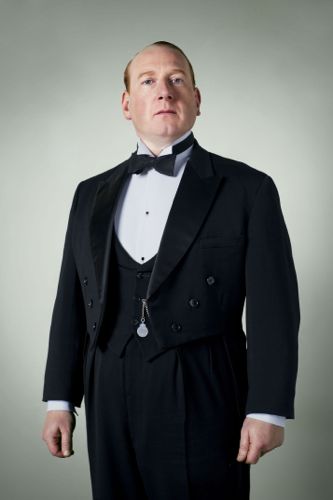
Q&A 2.
The “Downstairs” cast then joined Heidi and Faith:
Q: Humour an important part of the writing process for downstairs?
Heidi Thomas: “Yes. I think it seems to come through very naturally. When you’re downstairs you’re in a working environment and obviously there’s always banter in any working environment. And oddly I often feel as though the downstairs characters know each other better than the upstairs characters do. They’re quite communicative and you’ve got a larger group of people living in one room, essentially. Living cheek by jowl. I think the humour does rise up naturally. But I think that’s life though, isn’t it? Laughing one minute and grumpy or crying the next. The more of that you can get into the mix, the more it reminds us I think that these are real people leading…well they’re not real are they, they’re imaginary. (laughter) You have to try and reflect real life and that, to me, is what real life is all about.”
Jean Marsh (Rose Buck): “It’s business, isn’t it, downstairs? It’s so tough that you have humour as well, or you’d be a pain.”
Anne Reid (Mrs Thackeray): “And we’re more uninhibited than they are upstairs.”
Faith Penhale: “There’s a formality to upstairs. A lot of scandal, a lot of formality. Whereas downstairs it’s all a bit more open – hearts are worn on their sleeves. Which is great but does provide a very different atmosphere.”
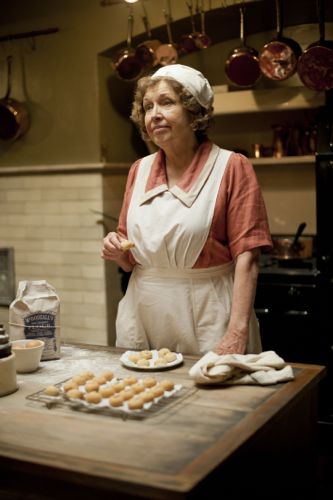
Q: A lot of tensions downstairs in the first episode. Does that carry on?
Heidi Thomas: “Yes it does. It’s like with any close-knit community, especially within a workplace, there are fissures and there are cracks and they paper over those cracks and they carry on. There are quarrels and fallings out. I always enjoy writing a good row, actually. Because I’m quite sort of compliant in life. I’m not a grew rower and it all comes out when I’m writing for this lot. They have arguments much, much better than I ever could.”
Anne Reid: “There’s a lot of humour to be got out of our characters, isn’t there? Particularly downstairs.”
Heidi Thomas: “I do think Upstairs Downstairs is probably the only series where you can have Anne Reid and Adrian Scarborough (Mr Pritchard) going at it hammer and tongs over some violet macaroons. That’s to come. That’s just to whet your appetite for episode two.”
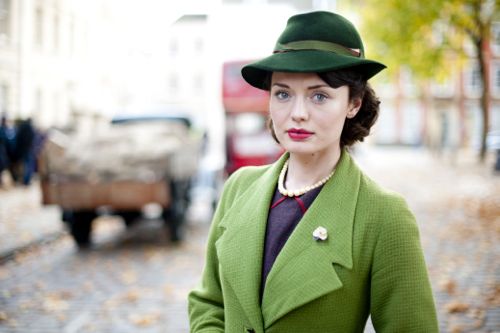
Q: Jean – were you just determined to get back?
Jean Marsh: “I was absolutely determined. Three weeks after the first episode I had a stroke and a heart attack. And in three weeks’ time I’d thrown myself out of the hospital. And I said, ‘I will be alright.’ The main doctor said, ‘Well alright, you can work again but you’ll only work four hours a day.’ And I said, ‘Terrific.’ (laughter) Everybody was so wonderful to me and so helpful that it was comparitively easy to get better. Really extraordinary – the support of everybody.”
Q: Does Mr Pritchard have more run-ins as the series develops?
Adrian Scarborough: “Continually, yes. He really does. He has run-ins practically every episode. Bless him. From the best of motives, he’s a bit of a pompous arse. But he has quite a strong moral code and he likes other people to live up to it too. He doesn’t shy away from confrontation, which is really lovely to play. Because I do. I run a mile. So it’s been quite good to exercise that limb.”
Faith Penhale: “But there is a heartbreaking story to come.”
Anne Reid: “He’s got really up himself actually. (laughter) No, not Adrian, I mean the character. Since Miss Buck wasn’t well he’s taken over the kitchen and it’s gone totally to his head. It’s a wonderful character. Having been on the ships with Errol Flynn and done James Cagney’s birthday party.”

Q: Over the course of the year that we are about to see on screen, do we see any shift in the relationship between downstairs and upstairs?
Heidi Thomas: “Yes. I think when people are looking at their own lives changing they start to question what’s going on in the world as a whole. And I think the thing that is most apparent – certainly it was to me when I was writing – is this idea that the downstairs characters no longer accept the status quo to quite the same extent. I’ve always been very careful in 165 Eaton Place to keep the barricades up, if you like, between upstairs and down. There aren’t personal relationships per se between upstairs and down, even though they’re being thrown together by circumstances. But by the end of the year, by the time war breaks out, they really have begun to question the status quo. Especially the younger characters.”
Q: Setting for possible next series?
Heidi Thomas: “You do hope that we get to tell the story of 165 during the Blitz. Nothing’s ever a given in television.”
Jean Marsh: “Not too far…”
Heidi Thomas: “Not too far. No, no. I was in the office the other day and there was a big book just called, ‘The Blitz,’ and I thought, ‘Well someone’s planning ahead.’ They had lots of photographs of rubble and things like that. So we shall see. But very much this has always been my hope, that we would go on from this one and follow these characters through the war. Because we’ve got a young man who would be of enlisting age, we’ve got women who are going to have to find new roles from themselves and the very physical fabric of the house will be threatened by air raids. I was always very fascinated by the idea that during the Second World War the rich people went and slept in the basement of The Dorchester and the poor people went down into the tube stations. I’m starting to mull over those scenaria at the moment. But we’ll see.”

Q: When you write the series, do you ask Jean’s opinion?
Jean Marsh: “Well, actually, I was born in 1934, so I remember it all. Yes, of course, I’m aware of everything because I was a Londoner and I was of normal working class people. And so the whole development…odd things…I was very aware, even when I was five, six, seven, of appeasement. And then Stalin was suddenly the hero. Everything happened constantly. And we didn’t know a lot of things and still don’t know maybe 50 years later.”
Heidi Thomas: “Also Jean, as a rights holder, as indeed does Eileen, reads all the scripts and has approval over everything. We always look forward to Jean’s feedback. Indeed the feedback of all of the rights holders because those are the people who looked after the series in its original incarnation. I think the longer I’ve spent working on the show, the better able I am to intuit, perhaps, what’s required. Because it is a brand and a world that you get to know very well, even when you’re in the act of bringing it forward in time. But Jean’s opinion is always very valuable to me. And she has a wonderful eye for the kind of things that fire me up, like the tiny details. So that’s always a huge help when she gives us some of that.”
Q: Heidi – is there a danger of too much focus in this country on period drama from the past?
Heidi Thomas: “I don’t think so. If you look, the BBC has got two contemporary series starting this week – Prisoners’ Wives and Inside Men. So I think the contemporary world is very well represented. To be quite honest, what I’ve noticed – I do rather specialise in period drama but I often find that the things that people really connect to in the period dramas are the timeless things. In Call The Midwife, yes it’s Fifties set and I think there is surface pleasure to be gained from the beautiful way that world is realised by people other than myself or people working on the scripts. But I think ultimately the big star of Call The Midwife is childbirth. Is there anything more timeless? One thinks not. And in Upstairs Downstairs, again, we’ve got the politics, we’ve got the exquisite costumes and sets which take my breath away every time I see the rushes. But ultimately I think what’s at the heart of it is human relationships. Jealousy, having a crush on someone, falling out of love with someone that you thought was going to be at the centre of your world forever. And those things are timeless. So I don’t think there’s any danger that we’re going to wear ourselves out at the moment.”

Q: Laura – you’re coming in (as a nursery maid) and going to shake things up. How is that going to develop?
Laura Haddock (Beryl Ballard): “Beryl comes into 165 having never worked in a household before. She’s there to save money to go and apprentice in a (hair) salon. So that’s her big dream. Her whole goal is to save this money up in her money pot and then leave. I suppose it’s not that easy once you get in. She becomes, quite quickly…because she’s very strong and quite intelligent and quite savvy, streetwise…she very quickly becomes part of the household. Lots of different things happen. There is a romance. What’s really exciting about her is that she’s very outspoken and she’s such a modern girl living in 1938 and she’s not bothered about what she says and whom she says it too. And it doesn’t really matter whether they’re upstairs or downstairs in her mind. If it’s her opinion she’s allowed to express it.”
Faith Penhale: “Which does get her into a little bit of trouble.”
Laura Haddock: “The downstairs staff just really don’t understand why she is the way that she is. They can’t believe that she says some of the things that she says.”
Heidi Thomas: “Beryl’s got a vision. I was partly inspired of writing Beryl by my own grandmother who was apprenticed to a court hairdresser and changed her own circumstances quite dramatically by marrying a businessman. And I just think Beryl has this vision, this sense of trajectory. She can see ahead to what she wants and she’s going to go out and get it. Whereas a lot of – not all – the downstairs characters are very much within the moment. They’re enjoying their jobs. They consider themselves privileged to have them. But they’re not necessarily thinking about working their way out of that house or up any sort of social ladder. But Beryl is. And I found that quite stimulating for me as a writer. And I think Laura plays that part beautifully. She does bring this wonderful mix of Thirties’ glamour and modern savvieness to the screen which I think is fabulous.”
Faith Penhale: “And, of course, she’s turned Harry Spargo’s head.”
Heidi Thomas: “Like that. It took her about five seconds.”
Neil Jackson (Harry Spargo): “What are you going to do?” (laughter)
Heidi Thomas: “It takes you (Neil / Harry) a bit longer than five seconds though, doesn’t it?”
Laura Haddock: “Much longer.” (laughter)
Neil Jackson: “She spurns any advances he has. She puts him down and doesn’t go for him as quickly as he thinks other girls would have gone. Which is really intriguing to him. Which is part of the allure of her. The fact that she closes the door very quickly at every single time time he tries to open it.”
Laura Haddock: “Because she has such a strong focus on bettering herself. She’s not necessarily in competition with anybody else. It’s herself that she competes with. She wants to better her position all the time. So she’s so focused on that when this handsome chap starts looking at her and starts making advances, it kind of throws her off a little bit. But then she gets back on track and then…”
Neil Jackson: “Because she’s so driven she doesn’t want anything to derail her from that. That sense of drive and focus infects several people in the house. Particularly Harry as he starts to look at other things that might be outside of the job, and the place, that he’s doing. So she helps my character broaden his horizons by virtue of her perspective.”
Heidi Thomas: “Yes, she’s a good catalyst, Beryl.”

Q: The food at Eaton Place?
Anne Reid: “I put on 10lbs in the last series because we had so many bowls of cream which I kept sticking my finger in. And this time I was absolutely determined not to do it. So I brought my scale to Cardiff and weighed myself. I only put on 4lbs this time.”
Q: What do you enjoy about putting real people like the Duke of Kent and Neville Chamberlain in the series?
Heidi Thomas: “It’s just something that Upstairs Downstairs demanded, initially, I think. Because this household, as with the long ago series, they’re very, very close to the corridors of power. It wasn’t something I think I’d fully anticipated when I wrote the Christmas short series, the idea that Hallam as a diplomat was going to very close to Chamberlain and Munich. And the characters themselves are absolutely fascinating. I love the Duke of Kent. I became very interested in Lord Halifax who did himself have a change of conscience half way through this very epoch-making month of September. I just think it’s very interesting to re-visit these characters, albeit often in cameo roles, who maybe haven’t had the light of history shone on them very much. I absolutely loved the idea, for example, in episode two – the Kennedys come to dinner because Joseph Kennedy, senior, was the American Ambassador. Of course there would have been some sort of social discourse with a gentleman of Hallam’s calibre. I also found out that Jack Kennedy came to London in that precise month, literally to research his dissertation which was about European politics. So that gave me little building blocks that I could put into those scenes to give them some structure. And it was lovely to introduce a callow JFK. He’s 19 and can’t really keep his end up in conversation. He’s very shy and a bit withdrawn. That was just a nice moment. I think it helps to enrich that world and give us a sense of the scale that this household was living on, really.”
Q: Does Johnny carry any amount of guilt because of what happens in the first episode?
Nico Mirallegro (Johnny Proude): “Yeah. He does. He’s very naive. At the end of the day he just wants to try and help Lady Agnes because he’s worried that she’s worried about her baby. He does feel very guilty.”

